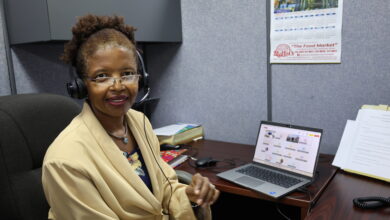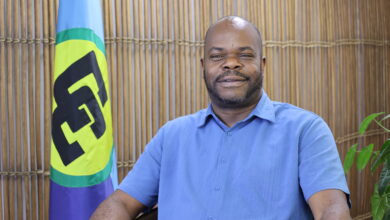The Seventh Regular Meeting of the Council for Trade and Economic Development (COTED) was held at the Headquarters of the Community on 8 October 1999. The Meeting was very positive and reached a number of important conclusions.
Held under the Chairmanship of Antigua and Barbuda, the COTED took the opportunity to assess the status of the effort to complete the legal arrangements to institutionalise the Single Market by 2000, as well as to review developments in several other areas. These areas included External Trade and Economic Relations, Sustainable Development, Services, Internal Trading Arrangements, Caribbean Fisheries Resources Assessment and Management, and the recent Eastern Caribbean Fish Kill.
The COTED focussed on the effort to complete the signing of Protocol III to Protocol VII which, together with Protocol II, provide the core of the arrangement for the Single Market. It was reassured that there were no policy objections to any of the Protocols in any of the three Member States which still had to complete the process. The Council recognised that the Special Meeting of the Conference of Heads of Government of the Caribbean Community (CARICOM) in Trinidad and Tobago on 26-27 October 1999 would provide an appropriate opportunity for those States to sign the relevant Protocols.
The COTED also reviewed the complementary measures such as the free movement of University graduates, artistes, sports persons, musicians and media workers, and the development of the Regional Capital Market which were agreed on to support the Single Market and Economy. It noted significant progress, but agreed to request the Prime Minister of Barbados, to convene a Special Session of the lead representatives for the various areas of the Single Market and Economy in the Year 2000, to review progress and develop a strategy for further advancement. The Barbados Prime Minister has lead responsibility for matters pertaining to the Single Market and Economy.
The COTED noted that five (5) Member States which account for over 80 per cent of imports from outside the Common Market have already implemented the final phase of the CET reduction. Several other Member States were on course to do so by 1 January 2000. It urged all Member States to try to reach this target.
The COTED agreed on arrangements to resolve a number of specific trading issues raised by particular Member States relating to products such as red kidney beans, rice, sugar and matches.
The COTED decided as part of the strategy to encourage the use of computers to remove the duty on compact discs for educational purposes. This complements its earlier decision to provide Member States with the option of applying a zero rate of the duty on computers under the CET.
The COTED reviewed the results of recent meetings of the CARICOM-United States Joint Committee on Development, Finance and Environmental Issues and CARICOM-US Trade and Investment Council. Particular attention was paid to the need to secure passage of CBI Enhancement legislation during the current session of the US Congress. The COTED also noted that Caribbean Foreign Ministers and the US Secretary of State at their consultations in New York on 29 September adopted a US$30 million Five-Year US-Caribbean Regional Strategy.
The ongoing efforts to secure a WTO compliant European Union Banana Import Regime that would ensure continued preferential access for Caribbean bananas into the European market, were noted by the COTED. In that regard, the Region will continue to seek a solution based on a Tariff Rate Quota system.
The attention of the Council was drawn to the OECD Harmful Tax Competition Report, which contained recommendations which threaten the growing offshore financial and other services centers in CARICOM. The COTED lent its support to the approach taken by the Region’s Finance Ministers to counter the Report.
With respect to the negotiations for a Post Lomé IV ACP-EU Convention, the COTED endorsed a proposal submitted by the Caribbean Tourism Organisation for a Chapter on Sustainable Tourism Development in the new Convention. This proposal will be advanced by the Region’s negotiators.
The COTED reviewed the preparations for the Tenth United Nations Conference on Trade and Development which will take place in Bangkok in February 2000. The Region is expected to participate actively in these Conferences.
In relation to Sustainable Development, the COTED accepted the importance of Member States acceding to, and participating actively in, multilateral environmental agreements such as the Framework Convention on Climate Change and the Basel Convention on the Transboundary Movement of Hazardous Wastes. It endorsed a proposal to strengthen the Region’s participation in these Agreements over the next three years. The COTED also endorsed a resolution from a High-Level Symposium on Maritime Safety held in Barbados on 29 March 1999 to strengthen the Region’s capacity in Maritime Safety and its compliance with International Conventions and Standards. This is an important part of the strategy for protecting the integrity of the Caribbean Sea.
COTED recognised the growing importance of the Services Sector in most CARICOM economies. It approved Terms of Reference for a Technical Working Group to coordinate and advise on priorities in Services Sector Development. The COTED welcomed a Report from a recent Workshop on Services organised by the CARICOM and Commonwealth Secretariats in St. Kitts and Nevis and a Report from the Minister of Commerce and Technology of Jamaica on the path-breaking agreement between the Government of Jamaica and Cable and Wireless.
The COTED expressed deep concern at the incidence of fish kill being experienced by several countries in the Eastern Caribbean and the deleterious impact on the lives and livelihood of the fishing communities. The COTED requested the CARICOM Secretariat to place the issue on the Agenda of the Special Meeting of the Conference and to set up an Inter-Governmental Committee, drawn from key regional agencies, to provide ongoing technical advice on mitigation measures.





